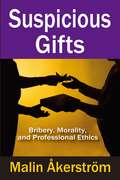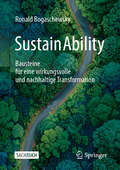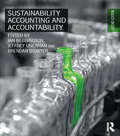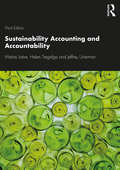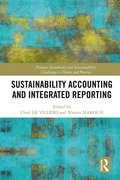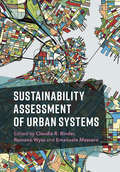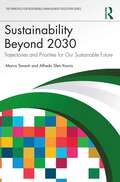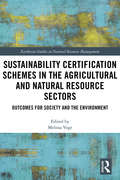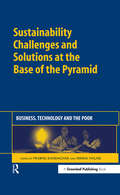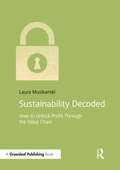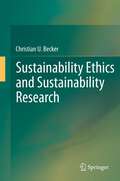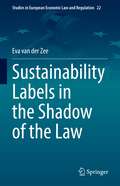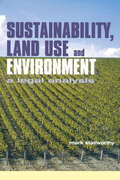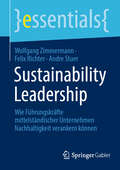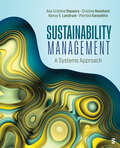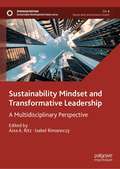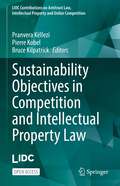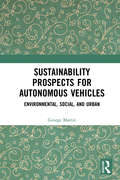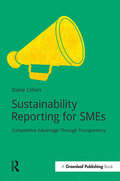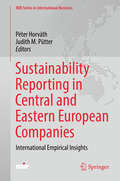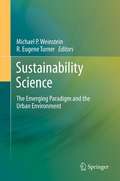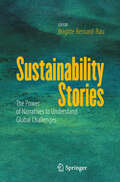- Table View
- List View
Suspicion of Vengeance: Suspicion Of Betrayal, Suspicion Of Malice, And Suspicion Of Vengeance (The Suspicion Series #6)
by Barbara ParkerAttorney Gail Connor is out to save a wrongly convicted man from execution in this &“thought-provoking mystery&” from the New York Times–bestselling author (Publishers Weekly). No one in the quiet coastal town of Stuart, Florida, can forget what happened twelve years ago. Notorious local Kenny Ray Clark brutally murdered a young wife and mother, and was righteously sentenced to death for the crime. But Kenny&’s grandmother, Gail&’s former housekeeper, won&’t believe it. So she goes to the only person who can help get her grandson off death row. It doesn&’t take Gail—or her fiancé, fellow attorney Anthony Quintana—long to see that the entire case was built on quicksand. The problem is that there are some very powerful people who don&’t want Kenny to go free. They want to keep the past buried. And if Gail doesn&’t watch her step, they&’ll bury her right along with it. This sixth in the bestselling Suspicion series, authored by an Edgar Award finalist and former Florida state prosecutor, guarantees that &“once readers are pulled in by the intricate plot . . . they won&’t want to skip a word&” (Publishers Weekly). Suspicion of Vengeance is the 6th book in the Suspicion series, but you may enjoy reading the series in any order.
Suspicious Activity: A Legal Thriller
by Mike Papantonio Christopher PaulosSuspicious Activity is an epic drama of intrigue, suspense, thrills, and legal combat—torn out of today&’s headlines. &“The purpose of the lawsuit is to fully expose the bank&’s willing support to groups that are killing Americans—and others—overseas.&” This announcement by attorney Nicholas &“Deke&” Deketomis sets up the gladiatorial arena between Big Banking and a team of well-meaning activist lawyers. The Iraq and Afghanistan Wars introduced the concept of IEDs (Improvised Explosive Devices) and EFPs (Explosively Formed Penetrators) that seriously maim or kill. It appears that these bombs are still being made and utilized by terrorists overseas. Who is funding them? Could it possibly be a large global bank with a major branch in New York? Is a reverse money laundering scheme in place that allows money transactions to bypass Department of Justice sanctions? Deke and his colleagues—co-counsel Michael Carey and investigators Carol Morris and Jake Rutledge—set out to uncover the deceit and bring the white collar criminals to justice. With the help of Michael&’s friend and war veteran, Joel Hartbeck—who first blows the whistle against the bank—the Deketomis team quickly discovers that they may have tackled more than they bargained for. A dangerous right wing paramilitary group might be involved in protecting the bank&’s interests, and Hartbeck soon goes missing. As Deke&’s lawsuit progresses, the sudden appearance of IEDs and EFPs on US highways cause death and destruction. Who is behind this evil?Readers who devour the financial-action-legal thrillers of Joseph Finder, Stephen Frey, and James Grippando will enjoy Suspicious Activity.
Suspicious Gifts: Bribery, Morality, and Professional Ethics
by Malin AkerstromGifts have been given and received in all eras and societies; gifts are part of a universal human exchange. The importance of creating and sustaining social bonds with the help of gifts is widely acknowledged by social scientists, not only from anthropological but also from economic, sociological, and political science perspectives. Contemporary anti-corruption campaigns, however, have led gifts to be viewed with ever-increasing suspicion, because it is feared that the social bonds created by gift giving may contaminate professional decision-making. Suspicious Gifts investigates the sensitive issue of gift exchanges and how they become an object of contention. Malin akerstro;m considers the moral dilemmas presented by bribes and gift giving as experienced by Swedish aid workers and professionals working in the public sector, business, and adoption agencies. She also deals with professionals' interaction with foreign officials or contractors. Often a gift is just that, although sometimes the gift giving may be seen by others as a bribe. akerstro;m highlights the tensions between strict regulations designed to prevent corruption with the human affection for the institution of gift giving. She argues that bribes and gifts are important social phenomena because they are windows into classic sociological and anthropological research issues concerning interaction, social control, exchange, and rituals. This unique analysis will be of keen interest to all sociologists, public officials, and professionals.
SustainAbility: Bausteine für eine wirkungsvolle und nachhaltige Transformation
by Ronald BogaschewskyNachhaltigkeit darf sich nicht nur an kurzfristigen Erfolgen oder ausschließlich an finanziellen Ergebnissen orientieren, sondern muss zwangsläufig langfristige Ziele wie Stabilität, Resilienz und Flexibilität verfolgen. Dies gilt auch für die Berücksichtigung ökologischer und sozialer Aspekte und die Umsetzung entsprechender Maßnahmen. Dieses Buch will mit sachlichen und wissenschaftlich fundierten Argumenten sowie unter Berücksichtigung historischer und aktueller Entwicklungen in Wirtschaft und Politik einen Beitrag zur Diskussion um die wichtigen und drängenden Fragen der Nachhaltigkeit leisten. Aus der Analyse werden 17 Bausteine abgeleitet, die essentielle Elemente einer nachhaltigen Transformation darstellen, die auch in der heutigen Realität umsetzbar erscheinen.
Sustainability Accounting and Accountability
by Jan Bebbington Jeffrey Unerman Brendan O'DwyerThe management and balancing of social, environmental and economic sustainability is one of the most complex and urgent challenges facing both private and public sector organizations today; with these challenges of sustainability posing many risks to, and many opportunities for, advancing the aims and performance of organizations. Accounting and accountability processes and practices provide key tools to help organizations to more effectively identify and manage the risks and opportunities of sustainability. Popular features from the first edition are retained, whilst recent developments in theory and practice are accounted for. New substantive chapters on water resource accounting, carbon accounting, and decision making have been introduced and the book continues to benefit from a host of expert contributors from around the world, including Jesse Dillard, Rob Gray, Craig Deegan. This comprehensive and authoritative textbook will continue to be a key resource for students of accounting and sustainability, as well as being a vital tool for researchers.
Sustainability Accounting and Accountability
by Jeffrey Unerman Helen Tregidga Matias LaineSustainability accounting and accountability is fundamental in the pursuit of low-carbon and less unsustainable societies. Highlighting that accounting, organisations and economic systems are intertwined with sustainability, the book discusses how sustainability accounting and accountability broaden the spectrum of information used in organisational decision-making and in evaluating organisational success. The authors show how sustainability accounting can prove to be transformative, but only if critical questions are sufficiently addressed. This new and completely rewritten edition provides a comprehensive overview of sustainability accounting and accountability. Relevant global context and key concepts are outlined providing the reader with the conceptual resources to engage with the topic. Drawing on the most recent research and topical practical insights, the book discusses a wide variety of sustainability accounting and accountability topics, including management accounting and organisational decision-making, sustainability reporting frameworks and practices, as well as ESG-investments, financial markets and risk management. The book also highlights the role accounting has with key sustainability issues through dedicated chapters on climate, water, biodiversity, human rights and economic inequality. Each chapter is supplemented with practical examples and academic reading lists to allow in-depth engagement with the key questions. Sustainability Accounting and Accountability walks the reader through a spectrum of themes which are essential for all accountants and organisations. It helps the reader to understand why our traditional accounting techniques and systems are not sufficient for navigating the contemporary sustainability challenges our societies are facing. This key book will be an essential resource for undergraduate and postgraduate instructors and students, as an entry point to sustainability accounting and accountability, as well as being a vital book for researchers.
Sustainability Accounting and Integrated Reporting (Finance, Governance and Sustainability)
by Charl De Villiers Warren MarounSustainability Accounting and Integrated Reporting deals with organizations’ assessment, articulation and disclosure of their social and environmental impact on various groups in society. There is increasingly an understanding that financial information does not sufficiently discharge organizational accountability to members of society who are demanding an account of the social and environmental impacts of companies’ and other organizations’ activities. As a result, organizations report ever more social and environmental information, and there are simultaneous movements towards providing the information in an integrated fashion, showing how social and environmental activities influence each other, members of society and the financial aims of the organization. The book Sustainability Accounting and Integrated Reporting provides a broad and comprehensive review of the field, focusing on the interconnection between different elements of these topics, often dealt with in isolation. The book examines the accounting involved in the collection and analysis of data, control processes over the data, how information is reported to external parties, and the assurance of the information being reported. The book thereby provides an overview useful to practitioners (including sustainability managers, consultants, members of the accounting profession, and other assurance providers), academics, and students.
Sustainability Assessment of Urban Systems
by Claudia R. Binder Romano Wyss Emanuele MassaroOur world is becoming more urban. More than fifty percent of the global population now lives in cities, which poses new challenges for sustainable development. This book integrates theory and methods of sustainability assessment with concepts from systems science to provide guidelines for assessing the sustainability of urban systems. It discusses different aspects of urban sustainability, from energy and housing, to mobility and health, covering social, economic and environmental factors, as well as the various stakeholders and actors involved. The book argues for the need to find models and solutions in order to design sustainable cities of the future in light of the complexity of urban social life. Including diverse case studies from the developed and developing world, this book provides a useful reference for researchers and students from a broad range of disciplines working in the field of sustainability, as well as for environmental consultants and policy makers.
Sustainability Beyond 2030: Trajectories and Priorities for Our Sustainable Future (The Principles for Responsible Management Education Series)
by Marco Tavanti Alfredo Sfeir-YounisSustainability Beyond 2030: Trajectories and Priorities for Our Sustainable Future is an indispensable guide to understanding our planet's sustainability past, present, and future. It is a tool for enlightenment, engagement, and empowerment towards shaping a sustainable world as we approach the milestone year of 2030.Written by renowned sustainability experts, Marco Tavanti and Alfredo Sfeir-Younis, who was a pioneer in the field and participated in the first 1972 United Nations Conference on the Human Environment, this book offers an in-depth analysis of critical environmental issues, human development challenges, and the economic complexities of fostering equitable and sustainable growth. In addition to evaluating various pivotal policies and events, by extracting patterns and trajectories that have shaped our present commitments to the 2030 SDGs and the 2050 climate goals, Sustainability Beyond 2030 boldly projects into the future, identifying core priorities likely to guide the global agenda beyond our current commitments. This foresight is coupled with well-informed recommendations, essential for building resilience and fostering future opportunities.This book is a call to action for current and future generations of sustainability leaders. It encourages readers, whether policymakers, academics, or engaged citizens, to participate in the collective responsibility of crafting a sustainable world for future generations.
Sustainability Certification Schemes in the Agricultural and Natural Resource Sectors: Outcomes for Society and the Environment (Earthscan Studies in Natural Resource Management)
by Melissa VogtThis book provides a balanced critique of a range of international sustainability certification schemes across nine agricultural and natural resource industries. Certification schemes set standards through intramarket private and multi-stakeholder mechanisms, and while third-party verification is often compulsory, certification schemes are regulated voluntarily rather than legislatively. This volume examines the intricacies of certification schemes and the issues they seek to address and provides the context within which each scheme operates. While a distinction between sustainability certifications and extra-markets or intrabusiness codes of conducts is made, the book also demonstrates how both are often working towards similar sustainability objectives. Each chapter highlights a different sector, including animal welfare, biodiversity, biofuels, coffee, fisheries, flowers, forest management and mining, with the contributions offering interdisciplinary perspectives and utilising a wide range of methodologies. The realities, achievements and challenges faced by varying certification schemes are discussed, identifying common outcomes and findings and concluding with recommendations for future practice and research. The book is aimed at advanced students, researchers and professionals in agribusiness, natural resource economics, sustainability assessment and corporate social responsibility.
Sustainability Challenges and Solutions at the Base of the Pyramid: Business, Technology and the Poor
by Minna Halme Prabhu KandacharAround the turn of the millennium it had become painfully evident that development aid, charity or "global business-as-usual" were not going to be the mechanisms to alleviate global poverty. Today, there is little dispute that poverty remains the most pressing global problem calling for innovative solutions. One recent strategy is the Base of the Pyramid (BoP) concept developed by Prahalad and Hart, which relies on entrepreneurial activity tapping into the previously ignored markets of the economically most disadvantaged. It is a process requiring innovations in several disciplines: technological, social and business.This book covers a number of areas. First, much of the current BoP discussion emphasises targeting products to the needs of the poor. But do we actually know what the real needs of the poor are? This book takes a bottom-up human-centred approach and examines examples that truly engage the poor in BoP product and service development. What types of needs assessment methodologies are indicated considering the cultural differences in BoP countries? Are the existing methodologies adequate? Do they need to be redefined and redeveloped? Second, the book considers how we can balance poverty alleviation and stimulate economic growth without stressing the ecosystem. Tragically, the poor are hardest hit by the adverse effects of environmental deterioration such as water shortages, climate change or the destruction of habitats. While the economic welfare of the poor is critical, the BoP approach must balance its inherent paradox of encouraging greater consumption while avoiding further pressures on environmental sustainability. The link between the BoP approach and sustainable development is a key feature of this book. Third, it looks at innovation and asks what kinds of"bottom-up" innovation (open source, technological, social and business) support BoP initiatives (and sustainable development)?Fourth, the book deals with the relationship between development assistance and BoP. Is a BoP strategy the antithesis to development aid or can these two co-exist or even complement each other?Finally, the book raises questions about the relationship between corporate responsibility and BoP. Is BoP a new form of corporate neo-colonialism or a new form of corporate responsibility? Although the BoP concept has unleashed an extensive and generally enthusiastic response from academics, businesses, NGOs and governments, the knowledge domain around this concept is still in the early stages of development. This book addresses that need with a focus on the needs of the end-users – the poor – as a starting point for BoP products and innovations. With contributions from both supporters and critics, it provides a treasure trove of global knowledge on how the concept has developed, what its successes and failures have been and what promise it holds as a long-term strategy for alleviating poverty and tackling global sustainability.
Sustainability Decoded: How to Unlock Profit Through the Value Chain (DoShorts)
by Laura MusikanskiThe value chain is the tried and true foundation of any profitable business.Sustainability Decoded is a no-nonsense business book that shows you how to increase profits by integrating sustainability into your company's value chain. This practical guide provides innovative tools and approaches for adding value at each station, including: Sustainability Matrix Decision Tool for Codes of Conduct; Triple Bottom Line Short Form; Eco-Label Graphic Matrix; Sustainability Ratio Guide; Life Cycle Analysis Grid; Local-Global Scorecard; the Redesign Card; the Green IT Checklist; the Balanced Scorecard for Life; the Biomimcry Backwards Forwards Tool.Sustainability Decoded provides a profitable means to practice sustainability. It is as useful to the non-business person who needs a quick guide to the practicalities and principles of adding value right across business processes as it is to the seasoned business professional looking for practical and profitable inspiration from sustainability. Includes case studies on Patagonia, and One PacificCoast Bank.
Sustainability Ethics and Sustainability Research
by Christian BeckerThe book identifies the specific ethical aspects of sustainability and develops ethical tools to analyze them. It also provides a methodological framework to integrate ethical and scientific analyses of sustainability issues, and explores the notion of a new type of self-reflective inter- and transdisciplinary sustainability research. With this, the book aims to strengthen the overall ability of academics to contribute to the analysis and solution of sustainability issues in an inclusive and integrated way.
Sustainability Labels in the Shadow of the Law (Studies in European Economic Law and Regulation #22)
by Eva van der ZeeThis book describes and examines three EU legal frameworks (EU competition law, EU consumer law, and EU fundamental rights law) that may affect the extent to which consumers purchase more sustainably. In doing so, this book goes beyond a rationalist understanding of the interpretation and application of EU law. Rational approaches have severely impacted the interpretation and application of EU law. Practice shows, however, that the implications of using a noncritical application of rationalist approaches in the interpretation and application of EU competition law, EU consumer law, and EU fundamental rights law to sustainability labels may have an inhibiting effect on sustainable consumption. The book offers remedies to overcome this inhibitive effect by critically applying insights from cognitive science and behavioral economics in the legal interpretation and application of EU law.
Sustainability Land Use and the Environment
by Mark StallworthyThis book focuses on land use, a topic at the heart of attempts to find sustainable solutions. It will be invaluable to practitioners and students of environmental law.
Sustainability Leadership: Wie Führungskräfte mitteltständischer Unternehmen Nachhaltigkeit verankern können (essentials)
by Wolfgang Zimmermann Felix Richter Andre StuerDas Buch zeigt, wie Mittelstands- und Familienunternehmen die Nachhaltigkeitswende ihres Unternehmens mit Hilfe von Sustainability Leadership meistern können. Denn zunehmende staatliche Vorgaben und die ökologische Transformation veranlassen viele Unternehmer dazu, sich aktiv mit dem Thema auseinanderzusetzen. Dabei stehen Unternehmen und Organisationen vor neuen Herausforderungen – alte Führungs- und Managementmuster passen nicht mehr. Als Führungskraft ist es nicht immer leicht, angesichts hoher Komplexität und Unsicherheit die Orientierung zu behalten und die eigene Unternehmensstrategie mit den Bedürfnissen von Mitarbeitenden und externen Stakeholdern in Einklang zu bringen. Die Autoren zeigen anhand von praxisnahen Beispielen und konkreten Werkzeugen einen ganzheitlichen und integrativen Leadershipansatz auf, wie Führungskräfte mittelständischer Unternehmen Nachhaltigkeit erfolgreich in ihrem Unternehmen verankern können. Besonders bemerkenswert: Dies kann die Geburtsstunde eines „Unternehmertum 2.0“ sein. Es basiert auf den oftmals tiefen Wurzeln des Unternehmens und neuen, innovativen Perspektiven. Interviews mit Unternehmerpersönlichkeiten vermitteln Impulse und geben Einblicke zu ihren Erfahrungen mit der Nachhaltigkeitstransformation.
Sustainability Management: A Systems Approach
by Ana Cristina Siqueira Cristina Neesham Nancy E. Landrum Patricia KanashiroConsumer demand for sustainable business practices has never been greater. Sustainability Management uses a systems thinking approach to illustrate the interdependencies among ecosystems, societies, organizations, and individuals. Authors Ana Cristina Siqueira, Cristina Neesham, Nancy E. Landrum, and Patricia Kanashiro explain why sustainability presents risks and opportunities for businesses, how sustainability can be a source of competitive advantage, and the business impact on the environment and society. This timely new text examines some of today’s most pressing issues including social justice, racial equity, human rights, and climate crisis. Case Studies tied to UN Sustainable Development Goals spotlight innovative sustainable strategies from companies around the world.
Sustainability Management: A Systems Approach
by Ana Cristina Siqueira Cristina Neesham Nancy E. Landrum Patricia KanashiroConsumer demand for sustainable business practices has never been greater. Sustainability Management uses a systems thinking approach to illustrate the interdependencies among ecosystems, societies, organizations, and individuals. Authors Ana Cristina Siqueira, Cristina Neesham, Nancy E. Landrum, and Patricia Kanashiro explain why sustainability presents risks and opportunities for businesses, how sustainability can be a source of competitive advantage, and the business impact on the environment and society. This timely new text examines some of today’s most pressing issues including social justice, racial equity, human rights, and climate crisis. Case Studies tied to UN Sustainable Development Goals spotlight innovative sustainable strategies from companies around the world.
Sustainability Mindset and Transformative Leadership: A Multidisciplinary Perspective (Sustainable Development Goals Series)
by Isabel Rimanoczy Aixa A. RitzThis volume examines the importance of leadership in developing an effective sustainability strategy. It defines the sustainability mindset and surveys the primary motivations, conditions, or environment(s) that cause leaders to embrace sustainable practices. As described in the UN Sustainable Development Goal 8, embracing the sustainability mindset will lead to greater productivity and promote economic growth.Organized into themes of organizational operations, leadership competencies, and leadership practices, the chapters, written by contributors representing global perspectives, tackle topics such as strategy, culture, and leadership styles in developing a new form of mindfulness for leaders as well as organizations. Recognizing the need for accelerated change in organizations as well as society at large, this book presents scholars with a framework for establishing a mindset for sustainability to foster much-needed transformative leadership.
Sustainability Objectives in Competition and Intellectual Property Law (LIDC Contributions on Antitrust Law, Intellectual Property and Unfair Competition)
by Bruce Kilpatrick Pierre Kobel Pranvera KëlleziThis open access volume of LIDC contributions focuses on how competition and intellectual property laws incorporate sustainability objectives. Businesses are increasingly embracing sustainability objectives, driven by the international community. Although competition and intellectual property law are certainly not the only tools for addressing sustainability issues, they can play a role in moving toward a more sustainable society.Sustainability has gained prominence in competition law in all jurisdictions covered in this volume. The contributions focus on classic questions such as whether sustainability agreements restrict competition and, if so, to what extent businesses can be exempted on efficiency grounds. The papers also raise a number of questions, in particular concerning the treatment of non-market efficiencies. The soft law and case law produced by competition authorities are examined, and the leadership role of some competition authorities in the field – from advocacy to policy papers and sustainability guidelines – is highlighted. The authors call for more individual guidance to provide enhanced transparency and clarity to industry, advisors and society at large on sustainability issues, with guidelines or sustainability-related block exemptions providing even greater legal certainty.With regard to intellectual property, the contributions examine various important issues, such as the need for intellectual property rights to remain technology-neutral, ways to promote the use of sustainable technologies and incentives for licensing, and ways to promote the dissemination of sustainable technologies, including compulsory licensing, cross-licensing, open source or FRAND licensing, and replacing the destruction of counterfeit goods with recycling. The papers also discuss greenwashing and how it can be addressed through revisions to trademarks and related rights.
Sustainability Prospects for Autonomous Vehicles: Environmental, Social, and Urban
by George T. MartinThe Autonomous Vehicle (AV) has been strongly heralded as the most exciting innovation in automobility for decades. Autonomous Vehicles are no longer an innovation of the future (seen only in science fiction) but are now being road-tested for use. And yet while the technical and economic success and possibilities of the AV have been widely debated, there has been a notable lack of discussion around the social, behavioural, and environmental implications. This book is the first to address these issues and to deeply consider the environmental and social sustainability outlook for the AV and how it will impact on communities. Environmental and social sustainability are goals unlike those of technical development (a new tool) and economic development (a new investment). The goal of sustainability is development of societies that live well and equitably within their ecological limits. Is it reasonable and desirable that only technical and economic success comprise the swelling AV parade, or should we be looking at the wider impacts on personal well-being, wider society, and the environment? The uptake for AVs looks to be lengthy, disjointed, and episodic, in large measure because it faces a range of known unknown risks. This book assesses the environmental and social sustainability potential for AVs based on their prospective energy use and their impacts on climate change, urban landscapes, public health, mobility inequalities, and individual and social well-being. It examines public attitudes about AV use and its risk of fostering a rebound effect that compromises potential sustainability gains. The book concludes with a discussion of critical issues involved in sustainable AV diffusion.
Sustainability Reporting for SMEs: Competitive Advantage Through Transparency (Doshorts Ser.)
by Elaine CohenSustainability reporting can help companies make more money. Sustainability Reporting for SMEs shows you how. Reporting, done well, requires a company to make public a set of promises that bind the company to its sustainability commitments. By adopting a transparent approach to both business practice and reporting, SMES can gain significant business advantage, both in terms of more effective internal processes and in terms of reputation and business-building.Elaine Cohen provides guidance and tools for actual actions that will improve the sustainability impacts of your company, and a process for reporting that adds value which is much greater than the printed or online report itself. This book will help SMEs develop "the transparency habit" so that they both make more money and contribute more proactively to the sustainability of our society and planet.It is vital reading for SME owners and managers, entrepreneurs, business and sustainability students and teachers, and consultants. Sustainability managers in larger organisations will find this book helpful in assisting their organisations manage their supply chains which undoubtedly include several SMEs.
Sustainability Reporting in Central and Eastern European Companies: International Empirical Insights (MIR Series in International Business)
by Péter Horváth Judith M. PütterThis collection of expert articles highlights the standards and practices concerning sustainability reporting among companies in Central and Eastern Europe (CEE). Due to the growing interest in corporate social responsibility issues, sustainability reporting has become increasingly common among businesses that claim to adhere to certain social, environmental and economic standards. While it can be observed that sustainability reporting is widely practiced in Western and Northern European countries, only few studies have been conducted on this topic in the CEE region. Drawing on a major empirical study involving researchers from 10 different CEE countries, this book addresses the status quo of sustainability reporting, outlines future prospects and provides essential recommendations for practitioners.
Sustainability Science
by R. Eugene Turner Michael P. WeinsteinThe object of this book is to highlight how the nascent field of sustainability science is addressing a key challenges for scientists; that is, understanding the workings of complex systems especially when humans are involved. A consistent thread in the sustainability science movement is the wide acknowledgement that greater degrees of integration across what are now segmented dimensions of extant Science and Technology systems will be a key factor in matching the most appropriate science and technology solutions to specific sustainability problems in specific places.
Sustainability Stories: The Power of Narratives to Understand Global Challenges
by Brigitte Bernard-Rau"Sustainability Stories" is an impactful book that offers a global perspective on the grand theme of sustainability. Through the lens of practitioners deeply committed to this cause, the book amplifies sometimes unheard voices, inspiring readers from diverse backgrounds to embrace environmental, social, and financial responsibilities. Each contributor, whether an entrepreneur, professor, lawyer, artist, or sustainability expert, acts as a visionary communicator, forging connections and leading by example. Featuring over 30 narratives from countries such as France, Germany, India, Morocco, Spain, Switzerland, and the United States, "Sustainability Stories" is sure to engage an international audience. Through its pages, this book spreads optimism, determination, and a desire for positive societal change. It empowers readers of all ages and educational backgrounds to join the movement toward a sustainable future. By sharing unique insights and experiences, "Sustainability Stories" serves as a catalyst, inspiring individuals to take action and make a difference in their professional practices, communities and lives.


